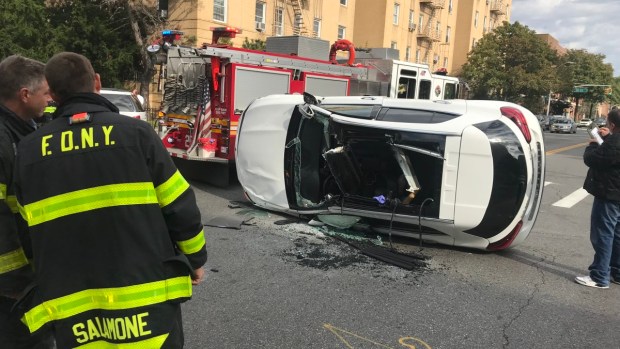Someone's gotta give.
City Council members who are pushing a bill to transfer of the NYPD's Collision Investigation Squad to the Department of Transportation remain defiant that if the de Blasio administration does not drop at least some of its opposition, the mayor might be looking at the very first veto override of his seven-plus-year tenure.
Council Member Ydanis Rodriguez, the bill's sponsor, reiterated on Tuesday that the purpose of the bill is to give the DOT control and oversight of the NYPD's collision analysis unit, even though the NYPD would retain its traditional role of making arrests or collecting evidence if investigators determine that a vehicular crime has occurred.
"If we have to, we can make the language more clear that this bill would not take away the role of criminal investigation from the NYPD," Rodriguez said. "The intention is simply to have DOT, which is the agency that is leading the Vision Zero initiative, oversight of crash investigations. This is about centralizing responsibility and improving safety."
Rodriguez — who called himself a "positive" person — said he'd rather work with the mayor to craft a bill that he can sign (as the Council did with the Streets Master Plan bill and the Vision Zero Design Standards bill). But he acknowledged that "we're not there yet."
"If we have to, we should pass this bill" and then override the expected veto, he said.
Streetsblog asked the mayor about Rodriguez's comments and the possibility of an historic veto override — and were promptly told that we have "a flair for the dramatic."
"And I appreciate that," Hizzoner continued, "but I don't think it's something that evades our ability to find common ground. We are going to find common ground because we have two things we need to achieve, and we will achieve them both."
But therein lies the problem. The "two things" to which the mayor referred (and has referred to in the past) are holding criminally reckless drivers accountable and helping DOT improve roadway design after crashes. The mayor has said both "things" require different agencies — the NYPD and the DOT. The council simply believes DOT should run the show, with the Collision Investigation Squad, perhaps still staffed by cops and detectives, being overseen by the transportation agency. At a Council hearing on the matter last month, Rodriguez pointed out why DOT oversight is so key; the agency testified that it sends someone to a crash site after the initial NYPD investigation. Rodriguez wants DOT to respond at the same time as criminal investigators.)
To some extent, the effort by the council to negotiate with the mayor over this particular bill is absurd, said Council Member Brad Lander, who is a co-sponsor of the bill, which he hopes will not only not be ground through the legislative sausage marker, but recut into prime filet mignon:
"I think the whole CIS could be run by the DOT," he told Streetsblog at a vigil for another victim of road violence — on yet another roadway that the city has been unable to make safe under the current investigation protocol. "I want people to show up at a crash scene and determine what happened, not just was the driver reckless or intentionally trying to injure someone, but what about the design of the road. What about ensuring that it doesn't happen again?"
Lander dismissed the opposition to the bill from law enforcement officials who argued at last month's hearing that only cops can collect evidence. "The DOT could have peace officers who are legally empowered to collect evidence and make arrests," he said. "We have Sanitation police, so we could have 'DOT police.' Peace officers can do field sobriety tests and make arrests."
And, Lander added, if there is suspected criminality, the existing bill still provides for the involvement of the NYPD, so policing is a straw man issue.
"We have never over-ridden a veto by this mayor, and I'm saying if we get to a point where the mayor won't see the benefits of this bill, we should pass it and override him," Lander said.
Lander also criticized the mayor for his underlying faith that the CIS could be improved.
"We have tried that a lot of times, first under mayor Bloomberg but also when Vision Zero was launched [in 2014]," Lander said. "We have constantly tried, but there is not a broad, meaningful institutional commitment inside the NYPD to traffic justice. So why not give this job to an agency that is actually committed to this kind of work?"
Council Speaker Corey Johnson, who is also a co-sponsor of the bill, is certainly rattling the cage as well.
"This bill is a vital part of our criminal justice reform package. I am glad the mayor agrees with the goals of this bill in principle, so I hope he will end up supporting it," Johnson said in a statement to Streetsblog. "If not, we will move forward without his support and we are prepared to override a veto if necessary."
Them's fighting words (no, they really are).






